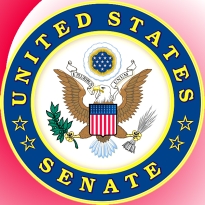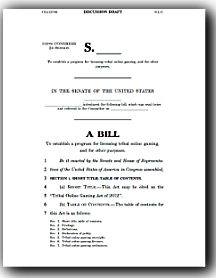 Shortly before the US Senate Committee on Indian Affairs (SCIA) convened its latest hearing on “Regulation of Tribal Gaming: From Brick and Mortar to the Internet,” the Committee released a discussion draft of a new internet gaming bill, the Tribal Online Gaming Act of 2012 (read it here). The Act is vague on specifics, seemingly more intended on reminding legislators of the longstanding Indian position that they be actively involved in any discussion of a federally regulated online gambling regime.
Shortly before the US Senate Committee on Indian Affairs (SCIA) convened its latest hearing on “Regulation of Tribal Gaming: From Brick and Mortar to the Internet,” the Committee released a discussion draft of a new internet gaming bill, the Tribal Online Gaming Act of 2012 (read it here). The Act is vague on specifics, seemingly more intended on reminding legislators of the longstanding Indian position that they be actively involved in any discussion of a federally regulated online gambling regime.
The Act envisions setting up an Office of Tribal Online Gaming, which would be headed by a Director appointed by the Secretary of Commerce. Any federally recognized tribe would be able to offer online gaming, unless it specifically opts out of the plan. Tribes participating in online gaming would be required to place 1% of gross gaming revenue in an escrow account and these funds would be disbursed in equal amounts to the tribes that opted out of online gaming.
Any tribe in good standing with the National Indian Gaming Commission (NIGC) and has regulated an Indian gaming facility for at least two years prior to the Act taking effect could apply to become a qualified Tribal Regulatory Body, able to issue licenses and oversee adherence to regulations. Tribes could form a consortium with other tribes and “non-tribal parties.” Tribes would be restricted to offering services to US residents over the age of 21, so long as those residents weren’t located in a jurisdiction that prohibited such activity. It would be the responsibility of the Secretary and the tribes to vet the suitability of service providers, including affiliates.
SENATE HEARING: BE PREPARED
The bill received little attention at the SCIA hearing, which was overseen by chairman Sen. Dan Akaka (D-HI), vice-chairman Sen. John Barrasso (R-NY), Sen. Al Franken (D-MN) and the late-arriving Sen. Tom Udall (D-NM). Akaka’s opening remarks described the intent of the hearing as furthering the dialogue between tribes, politicians and other online gaming stakeholders. Akaka said any expansion of gaming must ensure that the unique circumstances surrounding tribal sovereignty are maintained and that tribes should be on equal footing with their counterparts in the commercial gaming industry. Franken stated that out of concern for “economic fairness,” tribes needed to be consulted “at every step in the process.”
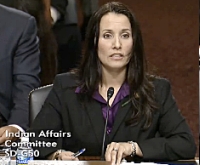 First up was Tracie Stevens, chairwoman of the NIGC. Her prepared remarks rehashed the recent NIGC tribal gaming revenue stats and touted her outfit’s ability to ensure minimal internal control standards are up to snuff via independent audits, site visits and compliance reports. Stevens also reiterated the well-worn talking point that the NIGC remained the only federal body that had experience regulating gaming on a national basis.
First up was Tracie Stevens, chairwoman of the NIGC. Her prepared remarks rehashed the recent NIGC tribal gaming revenue stats and touted her outfit’s ability to ensure minimal internal control standards are up to snuff via independent audits, site visits and compliance reports. Stevens also reiterated the well-worn talking point that the NIGC remained the only federal body that had experience regulating gaming on a national basis.
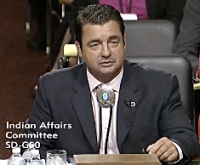 Panel #2 began with Bruce ‘Two Dogs’ Bozsum, chairman of the Mohegan Tribe in Uncasville, Connecticut and proud wearer of belt-buckle-sized bolo ties. Bozsum wasted little time in pronouncing his tribe’s preference for a federally-regulated online poker system rather than a “haphazard” state-by-state system that would offer “no guarantees on tribal sovereignty” and “little, if any, consideration” to tribal-state compacts. Bozsum suggested, without providing supporting evidence, that a state-by-state system would allow “too many minors, problem gamblers and others to fall through the cracks.” Bozsum said he had traveled to Europe to discuss online gaming regulation and policy with international operators. As a result, Bozsum said his group was developing its own regulatory standards that would be the equal of – or superior to – those much-ballyhooed “tough” Nevada ones.
Panel #2 began with Bruce ‘Two Dogs’ Bozsum, chairman of the Mohegan Tribe in Uncasville, Connecticut and proud wearer of belt-buckle-sized bolo ties. Bozsum wasted little time in pronouncing his tribe’s preference for a federally-regulated online poker system rather than a “haphazard” state-by-state system that would offer “no guarantees on tribal sovereignty” and “little, if any, consideration” to tribal-state compacts. Bozsum suggested, without providing supporting evidence, that a state-by-state system would allow “too many minors, problem gamblers and others to fall through the cracks.” Bozsum said he had traveled to Europe to discuss online gaming regulation and policy with international operators. As a result, Bozsum said his group was developing its own regulatory standards that would be the equal of – or superior to – those much-ballyhooed “tough” Nevada ones.
Asked by Franken to put a personal perspective on tribal life pre- and post-gaming, Bozsum referenced a medical diagnosis he received some years back, Bozsum said he “should have been dead,” but was instead saved by the care he received via the tribe’s gaming-funded health care program. Bozsum believes online gaming would allow tribes that missed out on the gaming boom due to unfavorable geography to reap the benefits via compacts with more experienced tribes.
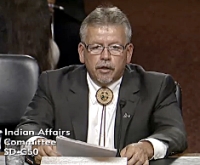 Joining Bozsum was Glen Gobin, secretary of the Tulalip Tribes of Washington state. Gobin began his testimony by noting that in his previous SCIA hearing appearance in November, he’d described online poker as a “direct threat” to tribal economies, and thus he couldn’t support the introduction of such a plan. But now that individual states are taking advantage of the Department of Justice’s December 2011 revised opinion on the scope of the Wire Act, Gobin believes “clarifying legislation” is necessary. However, Gobin doesn’t want to see a new federal body created to usurp the NIGC’s role in regulating tribal gaming, as that would result in “burdensome and duplicative” regulations that might limit tribes’ ability to compete with private companies. Gobin says the NIGC has adapted well to technological change in the past, and there was no reason to suggest it couldn’t do so in future.
Joining Bozsum was Glen Gobin, secretary of the Tulalip Tribes of Washington state. Gobin began his testimony by noting that in his previous SCIA hearing appearance in November, he’d described online poker as a “direct threat” to tribal economies, and thus he couldn’t support the introduction of such a plan. But now that individual states are taking advantage of the Department of Justice’s December 2011 revised opinion on the scope of the Wire Act, Gobin believes “clarifying legislation” is necessary. However, Gobin doesn’t want to see a new federal body created to usurp the NIGC’s role in regulating tribal gaming, as that would result in “burdensome and duplicative” regulations that might limit tribes’ ability to compete with private companies. Gobin says the NIGC has adapted well to technological change in the past, and there was no reason to suggest it couldn’t do so in future.
 Panel #3 was pre-empted by a break to allow the senators to head to the floor for a vote, but only Akaka returned to hear the rest of the witnesses. First up was Jamie Hummingbird, chair of the National Tribal Gaming Commissioners/Regulators. Hummingbird said his regulatory brethren “zealously protected” the integrity of the operations under their mandate, something that would be no less true if online gaming was added to the mix.
Panel #3 was pre-empted by a break to allow the senators to head to the floor for a vote, but only Akaka returned to hear the rest of the witnesses. First up was Jamie Hummingbird, chair of the National Tribal Gaming Commissioners/Regulators. Hummingbird said his regulatory brethren “zealously protected” the integrity of the operations under their mandate, something that would be no less true if online gaming was added to the mix.
 Hummingbird was followed by Elizabeth Homer, an attorney with Washington, DC firm Homer Law. Homer said the technology being discussed may have been new, but the legal, regulatory and policy issues were quite familiar to tribes. Homer was also eager to avoid the creation of any new federal body to oversee tribal gaming, as it takes “years, sometimes decades to assemble a competent federal agency” and such a delay “could prove economically disastrous for tribal governments.” Worse, it could create “interagency conflict” and subject tribes to the whims of inexperienced federal bureaucrats. Bottom line: the NIGC was the “ideal federal agency to administer tribal gaming regulation,” and any “bifurcation of federal oversight responsibilities” would be “imprudent.”
Hummingbird was followed by Elizabeth Homer, an attorney with Washington, DC firm Homer Law. Homer said the technology being discussed may have been new, but the legal, regulatory and policy issues were quite familiar to tribes. Homer was also eager to avoid the creation of any new federal body to oversee tribal gaming, as it takes “years, sometimes decades to assemble a competent federal agency” and such a delay “could prove economically disastrous for tribal governments.” Worse, it could create “interagency conflict” and subject tribes to the whims of inexperienced federal bureaucrats. Bottom line: the NIGC was the “ideal federal agency to administer tribal gaming regulation,” and any “bifurcation of federal oversight responsibilities” would be “imprudent.”
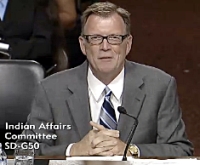 Up next was Jon Porter, former Nevada congressman and president of lobbying outfit Porter Gordon Silver Communications. While Porter lobbies on behalf of the Poker Players Alliance, Porter stressed that he was not appearing on the PPA’s behalf. Drawing on his past, Porter related how Nevada casino companies were intensely competitive, but they were also capable of working together on shared interests. Porter acknowledged that he favored a poker-only online universe, then launched into an attack on state lotteries, which Porter claimed were intent on introducing online scratch cards that were the equivalent of slot machines and that represented a threat to the casino interests of both Nevada and tribal casinos. Porter concluded by stating that a failure to act by Congress would represent an endorsement of the “abuse of the American people” by international online poker operators.
Up next was Jon Porter, former Nevada congressman and president of lobbying outfit Porter Gordon Silver Communications. While Porter lobbies on behalf of the Poker Players Alliance, Porter stressed that he was not appearing on the PPA’s behalf. Drawing on his past, Porter related how Nevada casino companies were intensely competitive, but they were also capable of working together on shared interests. Porter acknowledged that he favored a poker-only online universe, then launched into an attack on state lotteries, which Porter claimed were intent on introducing online scratch cards that were the equivalent of slot machines and that represented a threat to the casino interests of both Nevada and tribal casinos. Porter concluded by stating that a failure to act by Congress would represent an endorsement of the “abuse of the American people” by international online poker operators.
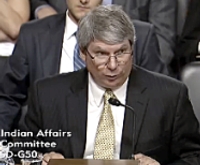 Porter was followed by Eugene Johnson, Spectrum Gaming Group’s senior associate for market research. Like Porter, Johnson proclaimed state lottery online scratch cards to be public enemy #1 and predicted that state monopolies would devastate tribal gaming operations. In Johnson’s view, tribal consortiums aka networks would be “essential” to success. Johnson also declared that international operators who took bets from US residents post-UIGEA should never be welcomed in a federally regulated system.
Porter was followed by Eugene Johnson, Spectrum Gaming Group’s senior associate for market research. Like Porter, Johnson proclaimed state lottery online scratch cards to be public enemy #1 and predicted that state monopolies would devastate tribal gaming operations. In Johnson’s view, tribal consortiums aka networks would be “essential” to success. Johnson also declared that international operators who took bets from US residents post-UIGEA should never be welcomed in a federally regulated system.
Asked to provide closing statements, Hummingbird provided the day’s most succinct takeaway. It was crucial for the feds to get things right out of the gate. Tribes, meanwhile, should “be aware, be prepared and be active.”
